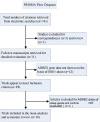Association of Gln27Glu and Arg16Gly polymorphisms in Beta2-adrenergic receptor gene with obesity susceptibility: a meta-analysis
- PMID: 24960039
- PMCID: PMC4069060
- DOI: 10.1371/journal.pone.0100489
Association of Gln27Glu and Arg16Gly polymorphisms in Beta2-adrenergic receptor gene with obesity susceptibility: a meta-analysis
Abstract
Background: The beta2-adrenergic receptor (ADRB2) gene polymorphism has been implicated in susceptibility to obesity, but study results are still controversial.
Objective: The present meta-analysis is performed to determine whether there are any associations between the Gln27Glu (rs1042714) or the Arg16Gly (rs1042713) polymorphisms in ADRB2 and obesity susceptibility.
Methods: The PubMed (1950-2014), Embase (1974-2014), and China National Knowledge Infrastructure (CNKI, 1994-2014) databases were searched using the search terms ("Beta2-adrenergic receptor", "β2-adrenergic receptor" or "ADRB2"), "polymorphism," and "obesity". Fixed- or random-effects pooled measures were determined on the bias of heterogeneity tests across studies. Publication bias was examined by Egger's test and the modified Begg's test.
Results: Eighteen published articles were selected for meta-analysis. Overall analyses showed that rs1042714 (Gln27Glu) was associated with significantly increased obesity risk in the heterozygote model (Gln/Glu vs. Gln/Gln: OR: 1.16, 95% CI: 1.04-1.30, I2 = 49%, P = 0.009) and the dominant model (Gln/Glu + Glu/Glu vs. Gln/Gln: OR: 1.2, 95% CI: 1.00-1.44, I2 = 55%, P = 0.04), whereas no significant association was found in the other models for rs1042714. Also, no significant association was found between the rs1042713 (Arg16Gly) gene polymorphism and the risk of obesity in all genetic models. In addition, neither rs1042713 (Arg16Gly) nor rs1042714 (Gln27Glu) showed any significant association with obesity susceptibility when the population were stratified based on gender.
Conclusion: Our meta-analysis revealed that the rs1042714 (Gln27Glu) polymorphism is associated with obesity susceptibility. However, our results do not support an association between rs1042713 (Arg16Gly) polymorphisms and obesity in the populations investigated. This conclusion warrants confirmation by more case-control and cohort studies.
Conflict of interest statement
Figures




References
-
- de Oliveira CM PA, de Andrade M, Soler JM, Krieger JE (2008) Heritability of cardiovascular risk factors in a Brazilian population: Baependi Heart Study. BMC Med Genet 9: 32 doi: 10.1186/1471-2350-1189-1132 - DOI - PMC - PubMed
-
- Speakman JR (2004) Obesity: the integrated roles of environment and genetics. J Nutr 134 8 Suppl: 2090S–2105S. - PubMed
-
- Reihsaus E, Innis M, MacIntyre N, Liggett SB (1993) Mutations in the gene encoding for the beta 2-adrenergic receptor in normal and asthmatic subjects. Am J Respir Cell Mol Biol 8: 334–339. - PubMed
-
- Pereira TV, Mingroni-Netto RC, Yamada Y (2011) ADRB2 and LEPR gene polymorphisms: synergistic effects on the risk of obesity in Japanese. Obesity (Silver Spring) 19: 1523–1527. - PubMed
-
- Lee S, Kim CM, Kim HJ, Park HS (2011) Interactive effects of main genotype, caloric intakes, and smoking status on risk of obesity. Asia Pac J Clin Nutr 20: 563–571. - PubMed
Publication types
MeSH terms
Substances
LinkOut - more resources
Full Text Sources
Other Literature Sources
Medical

